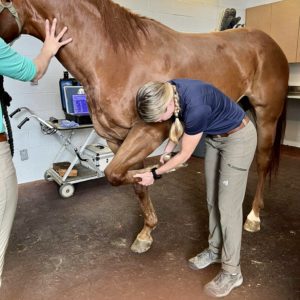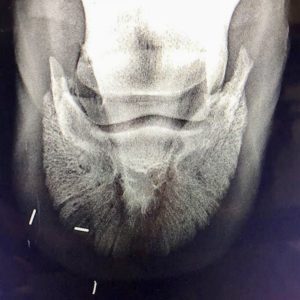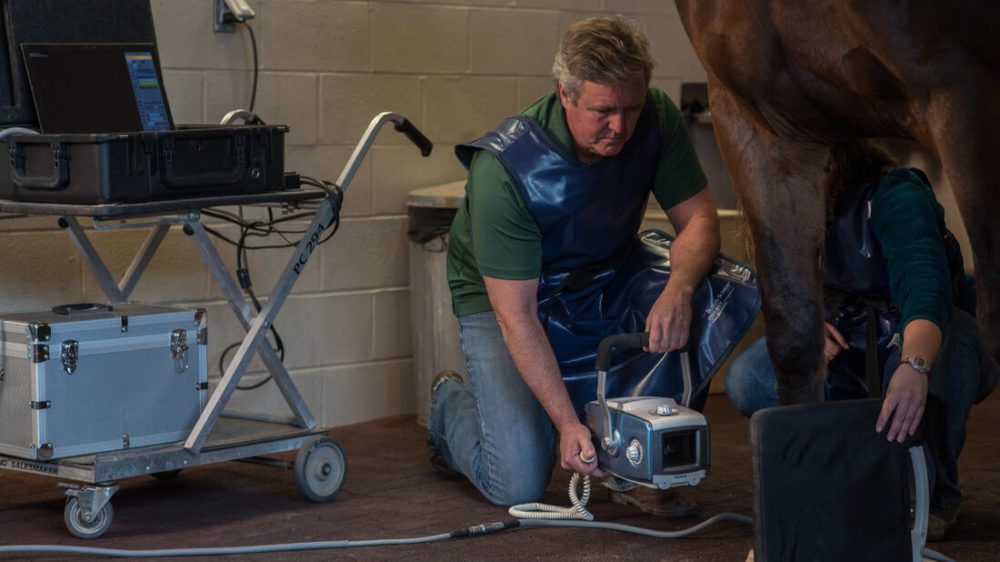The decision to purchase a horse is not one to be taken lightly. In the show horse context, aside from the up-front purchase price, owners must also consider the costs of board, training, showing, and maintenance of the animal to keep it in tip-top show shape.
Nearly all trainers and veterinarians recommend that buyers have a pre-purchase examination conducted before they purchase a show horse, especially when the animal is being sold for a significant amount of money. Among other things, x-rays are usually a major aspect of pre-purchase exams and can range depending on the purchaser’s preferences.
How much weight should a prospective buyer give them? We got the perspectives of leading trainer Jason English of Jason English Show Horses and Dr. Nathaniel Wright, DVM from Tennessee Equine Hospital on the importance of pre-purchase x-rays.
 Dr. Nathaniel Wright, DVM – The Veterinarian’s Perspective:
Dr. Nathaniel Wright, DVM – The Veterinarian’s Perspective:
Dr. Wright graduated from the University of Tennessee College of Veterinary Medicine in 2006. He then completed a one-year ambulatory internship at the Equine Medical Associates, where he obtained extensive hands-on training and field experience in equine sports medicine and lameness diagnostics.
Wright currently manages the Tennessee Equine Hospital and has conducted countless pre-purchase examinations for clients as both the examining veterinarian and a consulting veterinarian.
“My biggest advice regarding x-rays is that you cannot look at them in a vacuum.”
Dr. Wright cautions, “Specifically, I see x-rays as a deeper layer of investigation that is most appropriate after conducting a physical examination where you can lay both hands and eyes on the animal. If someone asks for my opinion based upon x-rays alone, it will come with a huge disclaimer about my inability to see the animal.”
 Dr. Wright has examined horses that are unsound in person, but surprisingly have relatively clean x-rays. Additionally, he has reviewed sound animals where he discovers extensive issues, or potential problems, in x-ray images.
Dr. Wright has examined horses that are unsound in person, but surprisingly have relatively clean x-rays. Additionally, he has reviewed sound animals where he discovers extensive issues, or potential problems, in x-ray images.
“X-rays are most helpful to get a literal baseline image of the horse, most useful for young animals, or to get more detailed information on a potential issue you observe in the physical exam.”
For example, Dr. Wright will recommend x-rays where a horse does not pass his physical evaluation because it is objectively lame or appears to favor a limb. He sees x-rays as a chance to explain such observations to himself and the prospective buyer.
 Dr. Wright says communication with your pre-purchase veterinarian is critical to getting the most value out of the x-rays. Specifically, your veterinarian needs to know (1) what you intend to use the horse for immediately, (2) what your long-term goals are for the animal, and (3) what you are willing to spend on maintenance or to resolve potential issues.
Dr. Wright says communication with your pre-purchase veterinarian is critical to getting the most value out of the x-rays. Specifically, your veterinarian needs to know (1) what you intend to use the horse for immediately, (2) what your long-term goals are for the animal, and (3) what you are willing to spend on maintenance or to resolve potential issues.
“X-rays can rule out horses with maintenance or issues that are too expensive to address for the particular buyer”
Dr. Wright warns buyers, however, that x-rays shouldn’t be used as a means to discredit a horse for every little issue. “I have come across few horses in my lifetime of work that are clean, especially as they age. If you are waiting to find a horse with a perfect set of images, chances are you’ll never actually buy anything.”
Dr. Wright believes buyers should look at x-rays as a more detailed diagnostic tool for determining whether a horse is suitable for their individual goals and budget. If the buyer cannot maintain the horse or address issues the horse has based on the images, then they shouldn’t buy the animal.
However, if the buyer loves the animal and is prepared to maintain or treat them, then x-rays provide a great tool to determine what treatment is recommended and set a baseline to compare future images to.
 Jason English – The Trainer’s Perspective:
Jason English – The Trainer’s Perspective:
English believes that x-rays function to serve three critical purposes in any pre-purchase exam: (1) a diagnostic tool for potential issues; (2) a predictive tool for potential maintenance; and (3) a tool for negotiation of the purchase price.
English has all of his clients get pre-purchase examinations on prospective horses, and he recommends x-rays as a part of all of those exams. Specifically, he believes x-rays help determine whether the price is fair and the resale potential.
English’s clients will often change horses as they grow as riders and their goals change. Therefore, he doesn’t like them to purchase horses they will have difficulty selling later.
 As a result, he tends to avoid horses that x-ray with more advanced osteochondritis dissecans (OCD), hocks with severe arthritis or issues that would make it difficult for them to move correctly, and horses with progressive navicular changes.
As a result, he tends to avoid horses that x-ray with more advanced osteochondritis dissecans (OCD), hocks with severe arthritis or issues that would make it difficult for them to move correctly, and horses with progressive navicular changes.
Like Dr. Wright, English admits that it is rare to find a horse with completely clean x-rays as he has seen weanlings with OCD or navicular changes. “There is an element of breeding that plays a role, and you cannot completely discredit a horse based on mild changes or imperfect x-rays.”
If a horse has spurs or chips in a spot that doesn’t affect the joint, English doesn’t allow those to become deal breakers, but they may become a negotiation tool if they require medical intervention.
 English believes x-rays also serve an essential future diagnostic purpose. “If your horse comes up sore one day in its left hind and you knew when you vetted it that there was a potential problem due to arthritis or a spur, it can help you have a good starting point to diagnose and treat the issue,” he explains.
English believes x-rays also serve an essential future diagnostic purpose. “If your horse comes up sore one day in its left hind and you knew when you vetted it that there was a potential problem due to arthritis or a spur, it can help you have a good starting point to diagnose and treat the issue,” he explains.
Additionally, x-rays can give you a baseline to compare any changes over time or lack thereof. If a horse doesn’t x-ray clean, but there aren’t any changes, and the horse is sound, then those x-rays shouldn’t result in an issue with the sale. Having multiple sets of x-rays without any significant change over time can be a real selling point.
English further advises prospective buyers to consider their ability to support the horse’s needs based on what is discovered in the x-rays. If, based upon x–rays, the horse will require specific farrier work, surgery, or regular joint injections. It is essential to know which local professionals you would need to retain to work on the animal and what their skill levels are.
While your trainer may be situated to have access to the right professionals, you may not be in a position to access them if you intend to take the horse home. If you cannot properly treat or maintain the horse, you should not purchase it or you should be prepared to keep it with the trainer.
Finally, English reminds readers that there is no substitute for watching a horse move. While x-rays are an excellent tool for getting more information, seeing the horse move on a hard surface will give a great idea of what areas are worth concern or further investigation.
***
Ultimately, x-rays provide a valuable tool for determining possible soundness issues and future maintenance. Our experts agree that x-rays should not be considered alone, but as a part of the picture of an animal’s overall health and fitness for a particular purpose and budget.








